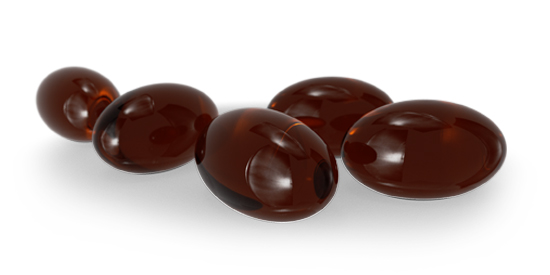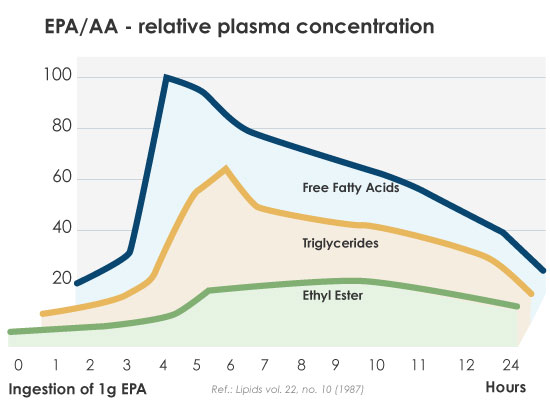Pure concentrated fish oil with vitamin B
- With free fatty acids providing 50% better absorption
- The fish oil contains 65% omega-3 fatty acids
- Combined with vitamins B12 and folic acid that supports a normal homocysteine metabolism
- The fish oil is carefully rinsed clean of pesticides, heavy metals, dioxins, and other toxic substances
- A fish oil product meeting or exceeding all EU regulatory requirements for cleanliness
- A soft gelatin capsule with a manageable capsule size
- Produced under strict pharmaceutical control
- Scientifically documented
| 1 capsule contains: | %RDA* | ||
|---|---|---|---|
| Fish oil (free fatty acids) | 500 mg | ||
| Omega-3 fatty acids | 325 mg | ||
| Including: EPA (Eicosapentanoic Acid) | 185 mg | ||
| DHA (docosahexaenoic acid) | 115 mg | ||
| Amount of EPA + DHA together is 300 mg per capsule, | |||
| - sufficient for obtaining beneficial effect | |||
| Vitamine B9 (Folic acid) | 100 µg | 50% | |
| Vitamin B12 (Cyanocobalamin) | 1 µg | 40% |
* RDA: Recommended Daily Allowance
1) Dosing advice: 10 capsules (3 grams of EPA + DHA) per day. Do not take more than 5 grams per day (17 capsules).
Product Facts
Directions
1 capsule a day, unless otherwise advised, preferably during / after meals.
The capsules should be swallowed whole, not chewed or divided.
Do not exceed the recommended daily dosage.
Dietary supplements should not replace a varied diet.
A healthy lifestyle and a varied balanced diet are important for maintaining good health.
Ingredients
Fish Oil Fatty Acids (in free form),
capsule shell: gelatin,
humectant: glycerol, purified water,
thickening agent: silicon dioxide,
color: ammonia caramel,
folic acid: pteroylmonoglutamic acid,
vitamin B12: cyanocobalamin.
Storage
Dark, dry and at room temperature.
Keep out of reach of young children.
What is Bio-Marine (Plus)?
 Bio-Marine Plus are soft gelatin capsules each containing 500 mg of fish oil including 185 mg EPA, 115 mg DHA and 25 mg other Omega 3 fatty acids. The Omega 3 content is predominantly in the form of easily absorbed free fatty acids. The fish oil is concentrated, so you get a fairly large amount of Omega 3 in a relatively small capsule. The fish oil is highly refined, meaning it is cleaned in a special process and is far below regulatory limits for pollution. The fish oil in Bio-Marine Plus does not come from aquaculture, but from wild fish. The oil is purified and is therefore free of contamination. Bio-Marine Plus is capsulated in an oxygen-free environment and has an extremely low peroxide value, as the oil is effectively protected against oxidation. Two homocysteine lowering B vitamins, folic acid and vitamin B12, are added to Bio-Marine Plus.
Bio-Marine Plus are soft gelatin capsules each containing 500 mg of fish oil including 185 mg EPA, 115 mg DHA and 25 mg other Omega 3 fatty acids. The Omega 3 content is predominantly in the form of easily absorbed free fatty acids. The fish oil is concentrated, so you get a fairly large amount of Omega 3 in a relatively small capsule. The fish oil is highly refined, meaning it is cleaned in a special process and is far below regulatory limits for pollution. The fish oil in Bio-Marine Plus does not come from aquaculture, but from wild fish. The oil is purified and is therefore free of contamination. Bio-Marine Plus is capsulated in an oxygen-free environment and has an extremely low peroxide value, as the oil is effectively protected against oxidation. Two homocysteine lowering B vitamins, folic acid and vitamin B12, are added to Bio-Marine Plus.
Free fatty acids in Bio-Marine Plus
In nature, omega-3 fatty acids occur as triglycerides that must be decomposed and broken down into “free” fatty acids before the digestive tract is able to absorb them. This process is enabled by a digestive enzyme called lipase. Bio-Marine Plus contains omega-3 in the form of free fatty acids that have already been broken down and are ready for absorbtion. The advantage with this type of omega-3 fatty acids is that they can be absorbed directly even by individuals with impaired lipid absorption.
As a natural consequence of the fact that the oil comes as free fatty acids, it can cause a burning sensation on the tongue if you chew the capsule. It is therefore recommended to swallow the capsule whole. The free fatty acids and the added B vitamins may also result in oil some odor from the oil in spite of the fact that the oil is fresh and clean.
Bio-Marin Plus is a good supplement for those who for various reasons do not eat fish in amounts recommended by health authorities and for those who need an extra clean and easily absorbed fish oil.
What does ”Plus” stand for?
Besides omega-3 fatty acids Bio-Marine Plus contains folic acid and vitamin B12. Both vitamins support the omega-3 fatty acids in contributing to a normal homocysteine metabolism. Also, folic acid contributes to a normal immune system, psycological function and blood formation. Furthermore folic acid has a role in the process of cell division and support to normal maternal tissue growth during pregnancy.
What are omega-3 fatty acids?
 Omega-3 fatty acids is a group of essential, polyunsaturated fatty acids that are primarily found in fish, namely oily fish like herring, salmon, and mackerel. The two most important omega-3 fatty acids are eicosapentaenoic acid (EPA) and docosahexaenoic acid (DHA).
Omega-3 fatty acids is a group of essential, polyunsaturated fatty acids that are primarily found in fish, namely oily fish like herring, salmon, and mackerel. The two most important omega-3 fatty acids are eicosapentaenoic acid (EPA) and docosahexaenoic acid (DHA).
Way back in the late 1970’s two Danish doctors, Bang and Dyerberg, demonstrated why Greenland Eskimos, because of their large consumption of fish and sea mammals, generally had better health than the Danish population*. If you don’t eat fish it may be an advantage to take a supplement of omega-3 fatty acids to ensure a sufficient intake of these beneficial compounds. In fact, it is ideal if a diet provides the right balance between omega-3 and omega-6 (a group of fatty acids found in plants). Experts believe it is ideal to ingest omega-3 and omega-6 in a 1:4 ratio.
* Bang HO, et al. Acta Med Scand 1976;200:69-73.
Dyerberg J, et al. Lancet 1978 Jul 15;2(8081):117-9
Good for heart, brain, and eyesight
EPA and DHA have several positive benefits. For instance, a 200 mg per day intake of DHA contributes to normal development of the brain, and eyes of the foetus and breastfed infants. In adults, 250 mg of DHA each day contributes to the maintenance of normal brain and vision. In addition, 250 mg of DHA and EPA a day contributes to normal function of the heart.
The mentioned levels correspond with 2 (200mg) and 3 (250mg) Bio-Marine capsules daily.
Why free fatty acids?
Fish oil must first be converted into free fatty acids before it can be absorbed. This conversion results in some loss of fatty acids. When you take fish oil as free fatty acids you get 50% better absorbtion. This allows you to achieve the same effect with less capsules.
Good for heart and blood vessels, for a healthy cholesterol level and for flexible joints.
Optimal purity and bioavailability
The fish oil in Bio-Marine Plus is highly refined in order to have a very high level of purity which means that the oil has undergone a three-step refining process, where the oil is thoroughly cleaned. One of the world’s leading technologies is used for screening and removal of unwanted particles like pesticides, heavy metals, furans (highly toxic waste particles from industrial burning) etc. This means that the content of several of these compounds may be far below the official threshold levels approved for fish and fish oil products.
The fact that the oil in Bio-Marine Plus is very clean was confirmed in a survey of pollutants in a number of fish oil products made in 2018* at the request of the independent Danish consumer organization TÆNK. The study found the following extremely low pollution values:
- Mercury (Hg): minimum 95% below the EU permitted content of mercury.
- Dioxin: 98% below the EU allowed limit on dioxin and dioxin-like PCBs.
* Ref. TÆNK, February 2019.
Fatty acids bioavilability

Omega 3 fish oils in the special free form present in Bio-Marine are assimilated and utilized by the body significantly better than both triglycerides and ethyl esters, used in other fish oil products.
Bio-Marine Plus – highlights
- A Finnish study that was published in a scientific journal* which demonstrated that people, who consumed Bio-Marine daily had the same health benefit as those who ate a fish meal four to five times per week
- Bio-Marine Plus contains 500 mg of concentrated fish oil in each capsule with an omega-3 content of 65% (38% EPA, 22% DHA, and 5 % other omega 3 fatty acids)
- Bio-Marine Plus is capsulated in an oxygen-free environment and has an extremely low peroxide count due to the fact that the oil is effectively protected against oxidation (rancidity)
*) J. Agren et al. 1996; Eur. Journal of Clinical Nutrition 50;765-71.
Official claims
 The European Food Safety Authority (EFSA) has evaluated the evidence behind essential omega 3 fatty acids, folic acid and vitamin B12 and has acknowledged the following claims:
The European Food Safety Authority (EFSA) has evaluated the evidence behind essential omega 3 fatty acids, folic acid and vitamin B12 and has acknowledged the following claims:
- EPA* and DHA* contributes to normal heart function
* Min. 250 mg of EPA / DHA per day - DHA* helps to maintain normal vision
* Min. 250 mg DHA per day - DHA* contributes to the maintenance of normal brain function
* Min. 250 mg DHA per day - Intake of docosahexaenoic acid (DHA) intake contributes to the normal development of vision in infants aged up to 12 months of age* (Art. 14)
* The beneficial effect is obtained with a daily intake of 100 mg DHA - Maternal intake contributes to the normal development of the brain of the foetus and breastfed infants ** (Art. 14)
** Info to pregnant and lactating woman: The beneficial effect is obtained with a daily intake of 200 mg of DHA in addition to the recommended daily intake of omega-3 fatty acids for adults, ie: 250 mg DHA and eicosapentaenoic acid (EPA). The claim can be used only for food which provides a daily intake of at least 200 mg DHA - Maternal intake of docosahexaenoic acid (DHA) contributes to normal brain development in the fetus and infants are breastfed *** (Art. 14)
*** Info to pregnant and lactating woman: The beneficial effect is obtained with a daily intake of 200 mg of DHA in addition to the recommended daily intake for omega-3 fatty acids for adults, i.e.: 250 mg DHA and eicosapentaenoic acid (EPA). The claim can be used only for food which provides a daily intake of at least 200 mg DHA - Folic acid contributes to normal maternal tissue growth during pregnancy
- Folic acid contributes to normal amino acid synthesis
- Folic acid contributes to normal blood formation
- Folic acid, vitamin B12 contributes to normal homocysteine metabolism
- Folic acid contributes to normal psychological function
- Folic acid and vitamin B12 contributes to normal function of the immune system
- Folic acid and vitamin B12 contributes to the reduction of tiredness and fatigue
- Folic acid and vitamin B12 has a role in the process of cell division
- Vitamin B12 contributes to normal energy-yielding metabolism
- Vitamin B 12 contributes to normal functioning of the nervous system
- Vitamin B12 contributes to normal psychological function
- Vitamin B12 contributes to normal red blood cell formation


